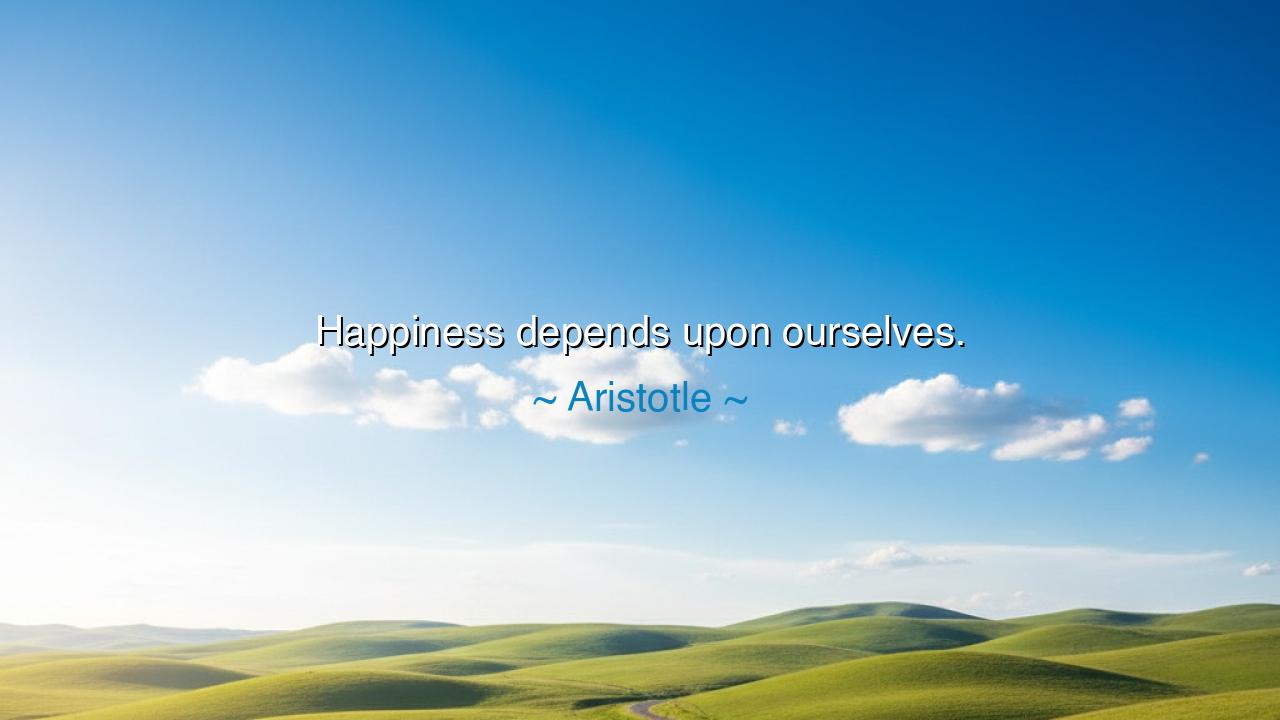
Happiness depends upon ourselves.






"Happiness depends upon ourselves." So spoke Aristotle, the philosopher of reason and virtue, whose wisdom still shines like a lantern through the centuries. In this brief but eternal truth, he proclaims that happiness is not a gift bestowed by the gods, nor the result of fortune’s favor, but the creation of the soul itself. To him, it was not the fleeting pleasure of the senses, but the art of living well, the harmony of one’s actions, thoughts, and purpose. He saw happiness—what he called eudaimonia—not as emotion, but as the highest fulfillment of human existence, achieved when a person lives in accordance with reason and virtue.
In the ancient world, men sought happiness in many ways—through wealth, glory, indulgence, or power. Yet Aristotle, in his Nicomachean Ethics, revealed the deeper law of life: that none of these things, by themselves, can bring peace to the heart. For riches may vanish, power may fall, and pleasures fade like mist in the morning sun. True happiness, he taught, springs from within—from the cultivation of one’s character and the alignment of the soul with truth. When we live wisely, when we act justly, when we govern our desires with reason, we become whole—and in that wholeness, we find joy that no misfortune can destroy.
To say that happiness depends upon ourselves is to declare that we are not the slaves of circumstance. The winds of fate may blow as they please, but it is the helmsman of the soul who chooses how to steer. Even when sorrow comes, the wise do not despair, for they know that peace lies not in what happens, but in how we respond. This was the philosophy that shaped the hearts of heroes and thinkers alike, from the Stoics of Rome to the sages of the East. The truly happy man is not he who possesses everything, but he who has mastered himself.
Consider the life of Socrates, the teacher of Aristotle’s own master, Plato. Socrates was condemned to death for speaking truth in an age of ignorance. Yet even in his final hours, he drank the cup of hemlock with serenity. He did not fear death, for his happiness had never rested on the length of his days or the judgment of others. It rested upon the virtue of his soul—his unwavering commitment to truth and conscience. He proved, in the face of injustice, that happiness is not destroyed by circumstance, for it is born of the inner life, untouched by the world’s cruelty.
Aristotle’s teaching has echoed across time, guiding even the modern seeker. Many chase happiness as though it were a prize to be caught—a better house, a higher title, the admiration of others. Yet as soon as they grasp it, it slips away, for they have looked outward when they should have looked inward. Happiness cannot be hunted in the marketplace or found in the praise of men. It must be built, day by day, through the practice of gratitude, discipline, and virtue. It is the fruit of living rightly—not in perfection, but in harmony with the good.
Even history’s greatest leaders have discovered this truth. Marcus Aurelius, emperor of Rome, ruled an empire but lived like a monk of the mind. Amid war and betrayal, he wrote in his meditations: “Very little is needed to make a happy life; it is all within yourself.” His power did not make him wise—his wisdom made him powerful. He followed the same truth Aristotle proclaimed centuries before: that happiness is not something given, but something earned by mastering one’s soul.
So, my children of tomorrow, take this lesson deep into your hearts: do not wait for life to hand you peace. Do not say, “I will be happy when…” For the world will always change, and fortune will always turn. Instead, turn inward. Cultivate virtue, seek wisdom, act with courage, and nurture gratitude. In doing so, you will discover that happiness is not a destination, but a way of traveling—a harmony between who you are and what you choose to become.
And when you awaken each morning, remember Aristotle’s eternal truth: that happiness depends upon ourselves. Let your thoughts be guided by reason, your actions by goodness, and your heart by balance. For in mastering yourself, you master the world—and in that mastery, you shall find not just fleeting pleasure, but the enduring radiance of a life well lived.






AAdministratorAdministrator
Welcome, honored guests. Please leave a comment, we will respond soon